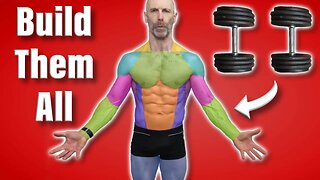How Important is Rep Speed?
How important is rep speed?
Facebook; https://www.facebook.com/Fit-and-50-548844435514900/
Email; 1shark1bite@gmail.com
My Amazon page link; https://www.amazon.com/shop/fitand50
My Affiliate link to Lebert for their Equalizer bars and more; http://www.easywebautomation.com/app/?af=1679568 and use the discount code LFI20 you will receive 20 dollars off your purchase.Here is a list of great Lebert products; Lebert Fitness Equalizer Bar, the Lebert Fitness Equalizer® XL - Black/Chrome, Lebert SRT Barbell, Lebert Buddy Systems and the Parallettes.
Today we are going to focus on the individual rep. So if the time spent on the overall set is the same which rep pace is going to build the most muscle? A nice even rep pace that maybe on the quicker side but still under control or a slow deliberate rep with a 4 second negative which is the down portion of the rep and a 4 second concentric which is the push or pull portion. So we are basically comparing a 8 second rep to a 2 or 3 second rep.
Some may think the slow deliberate rep would be the winner for sure! There are some advantages to doing reps slower. Sometimes when your having trouble with the mind muscle connection slowing down the rep can help you really feel the muscle work. Or if your form has gotten sloppy, lighting up the weight, slowing down the rep and really focusing on form will protect you from injury and get you back on track to safely making progress.
Now there is a trade off here, when we decide to do our reps slower. To illustrate Just think about one of the sets you do in your own workout right now. How much weight do you do? And how many reps?
Now imagine how many reps you could do, if you did those reps at half the pace. There is no way you could move that same amount of weight for as many reps. So in order to keep the set length the same you would have to lighten up the weight.
Now because we made the length of the set the same, the time under tension is the same no matter what pace we do the rep. But one very important variable did change and that is the total volume of weight moved. The quicker paced reps would have moved a greater volume of weight.
Now they did a study similar to this except they kept the weight the same for both the very slow reps, which were done with a 10 second concentric and eccentric pace. And they compared this to the lifters natural pace. These were experienced lifters who did these sets on separate days and they were tested in both the squat and shoulder press performing the reps to failure.
They compared the force, power and volume of both sets. With the results of all three being significantly lower in the very slow rep set. Indicating that the volume done in a given set does make a difference.
One of the studies that is often quoted supporting a slower rep pace is one that involves leg extensions. With the slow reps being done at a 12 second pace and the fast reps being a 1 second pace. But the mistake they made is they took the slow reps to failure and just did that same number of reps on the quicker set not bringing the quick set to failure.
What the found was the the slower rep pace brought to failure produced greater protein synthesis than the quicker pace that didn’t go to failure. This is no surprise as we have long since know training to failure or near to failure brings about the most muscle hypertrophy.
So what is important in our working sets isn’t so much the pace of the reps but the intensity of the set making sure we are pushing the set near to or to failure. Using a natural pace no need to go overly quick or super slow as a matter of fact as you come closer to the end of your set and closer to failure your rep pace will slowdown naturally increasing the time under tension of those last few reps. But if you really want to build more muscle you need to keep working out while having fun.
Link to study showing superior force, power and volume to high reps brought to failure; https://www.ncbi.nlm.nih.gov/pubmed/17194227
Link to study with leg extensions brought to failure with a very slow pace;
https://www.researchgate.net/publication/262788740_Effect_of_Movement_Velocity_during_Resistance_Training_on_Neuromuscular_Performance
-
 4:57
4:57
Fit and 50
10 months ago $0.06 earnedBuild Full Body Muscle at Home With Dumbbells Over 50 (Real Growth)
2501 -
 LIVE
LIVE
EricJohnPizzaArtist
3 hours agoAwesome Sauce with Eric John
1,513 watching -
 3:00:20
3:00:20
vivafrei
14 hours agoEp. 213: SHUTTING DOWN ALEX JONES? Biden Regime War in FULL FORCE! Viva & Barnes Live!
116K228 -
 1:08:34
1:08:34
The Late Kick with Josh Pate
5 hours agoLate Kick Live Ep 518: CFB’s Wildest Era | Biggest 2024 ?s | Impact Freshmen | Bold Predictions
11.8K -
 12:00
12:00
Dr. Eric Berg
1 day agoWhat Exercise Burns the Most Calories?
35.1K21 -
 4:48:29
4:48:29
LumpyPotatoX2
9 hours ago$10,000 PUBG Tournament w/GamersError - #RumbleTakeover
38.9K11 -
 3:22
3:22
One Bite Pizza Reviews
2 days agoBarstool Pizza Review - Marco Pizzeria & Restaurant (Branford, CT)
42.7K24 -
 41:46
41:46
Standpoint with Gabe Groisman
14 hours agoEp. 27. From GameStop to the NBA. Gabe Plotkin
43K4 -
 55:04
55:04
Matt Kohrs
11 hours agoThe Volatile Week Ahead || The MK Show
65.7K23 -
 26:18
26:18
Stephen Gardner
10 hours agoTop Republican UNLOADS on Democrats and Biden's MENTAL HEALTH!!
73K110